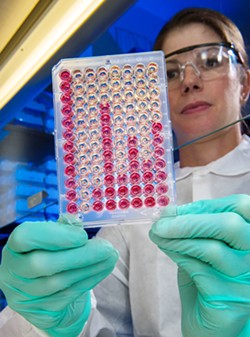Editor's note: This is the second installment of a two-part account of getting tested for COVID-19.
In our government's rush to respond to the coronavirus pandemic, the U.S. Food and Drug Administration (FDA) issued a flurry of emergency approvals for COVID-19 tests, drugs, and medical devices, authorizing their use without "adequate, approved, and available alternatives."

- Photo Courtesy Of The CDC
- ANTIBODIES In Part II of my series about getting tested for COVID-19, I explore the local options for antibody tests.
On one hand, the orders enabled critical supplies and technology to be quickly deployed across the country. On the other hand, the scramble left us vulnerable to unreliable products and even scams.
Antibody tests—blood tests that look for COVID-19 antibodies to indicate whether someone acquired the virus in the past—fall onto that blurry category. To date, there are 13 different antibody tests with FDA authorization; none of them are 100 percent reliable. Until recently, the FDA also allowed unauthorized antibody tests to flood the market. Those are even less reliable.
Medical experts, including the FDA and Centers for Disease Control (CDC), warn that antibody tests should be approached with caution, their results taken with a grain of salt. Even an accurate positive test doesn't guarantee immunity from the virus in the future. Yet, health officials also say they can provide the patient and the medical community useful data about the historical spread of COVID-19.
Knowing the controversy and uncertainty about antibody tests, I decided to seek one out as part of this series. In Part I ("Getting tested," May 28), I shared my experience of getting tested for an active COVID-19 infection. This free swab test, available to all San Luis Obispo County residents, came back negative for me.
Finding an antibody test requires a little more digging. In my research, I find that most local medical clinics, like Dignity Health's, only offer the test on a physician order.
Kevin Ferguson, pathologist laboratory medical director for Dignity Health Central Coast, tells me that antibody testing "can be helpful in determining if an individual may have had COVID-19 previously." But he added that they're "most useful in patients who demonstrated COVID-related symptoms in the past" and emphasized that "it is still unknown whether or not the presence of the antibody confers any immunity to future infection."
While the tests are expected to become more widely available this summer, they'll continue to only be offered at Dignity "as determined and ordered by a physician."
"Patients with antibody test orders can present to any of the Dignity Health Laboratory Patient Service Centers across the Central Coast," Ferguson says. "There is no cost to a patient for antibody testing."
But because seeing a doctor usually costs a chunk of change, and I'm looking for the lowest cost option available, I keep looking.
That's when I come across LabCorp and Quest Diagnostics—two national lab giants. Both companies are advertising their antibody tests online, and LabCorp has local offices in Arroyo Grande and Templeton.
I call LabCorp's Arroyo Grande location and ask if I can sign up for a test directly. The answer is yes, and they point me to their website. There, I fill out an antibody test questionnaire, provide my insurance information, and create a patient account. At the end, I'm accepted for testing and offered an appointment for the next morning. I'm charged a $10 fee upfront, which they say is the extent of the out-of-pocket costs. But I remain skeptical.
When I arrive at LabCorp's suite in the Oak Park Plaza Shopping Center the next day, I am the only patient there. A person at the counter checks me in and directs me to a chair to draw my blood. After filling one vial, she says the sample will be shipped to a LabCorp lab for testing, and I'll have my results in a couple of days.
I call Anthem Blue Cross, my insurance provider, to ask if this test is really fully covered. I'm assured that it is—that all COVID-19 related tests are covered. I'm not sure if that's the case for all insurances or how uninsured patients are handled.
The next morning, my results come back: They're negative. Based on my research, I know to check which testing device LabCorp used to make sure it's one of the 13 authorized by the FDA. It is: the DiaSorin Liasion SARS-CoV-2 IgG assay. According to the FDA, this test is estimated to be 99 percent accurate on negative tests and 98 percent on positive tests.
In my mind, these results confirm that, in all likelihood, I did not unwittingly contract COVID-19 in the past. My blood shows no evidence of an immune response to the virus. That said, my patient report explicitly reminds me that "serologic results should not be used as the sole basis to diagnose or exclude recent [COVID-19] infection." Δ
Assistant Editor Peter Johnson can be reached at [email protected].
Comments (3)
Showing 1-3 of 3